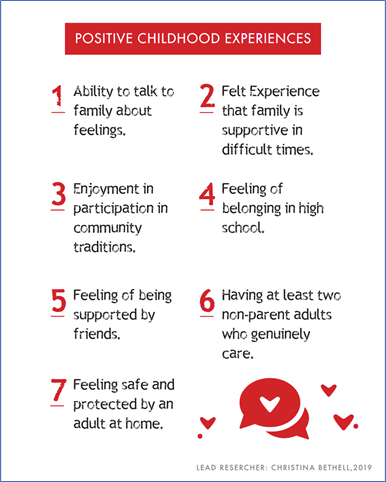It’s back to school time. Amidst the growing concerns about the Delta variant, students, families and educators are heading back into the routine of daily in-person learning. The stress of health concerns, financial pressures, food insecurity and isolation, this past year has taken a toll on all of us. Yet, we are resilient.
Resilience is defined as the ability to bounce back despite adversity. How do we build and maintain resilience in our children? We must be intentional about cultivating Positive Childhood Experiences.
First, let me acknowledge that we live in a world that prefers to focus on the negative rather than the positive. For some reason, we like to focus on what is wrong. I suggest that we take another tact. Instead, let us join forces and focus on the good.
In the Fall of 2019, Dr. Christina Bethell of Johns Hopkins University published her research about how Positive Childhood Experiences counteract Adverse Childhood Experiences. In the language of the Positive Youth Development Theory, she identified seven protective factors that can mitigate the risk factors.
The following is an overview of these Positive Childhood Experiences with some strategies for each. Please keep in mind that I have extended the definition of family to include caring adults present in a child’s life.

Ability to talk to family about feelings. We can provide a safe place for students to reflect on what they are thinking and feeling about what is happening in their world at home, with friends, at school, and in the greater community. This comes by initiating conversations then taking the time to listen with our whole hearts.
Felt experience that family is supportive in difficult times. We are all living together through this difficult time in history. Additionally, there are other factors individual students are facing. They need to know we are here to support them and connect them and their families to necessary resources.
Enjoyment in participation in community traditions. Whether it’s Friday night football games and Homecoming or Donuts with Dad and book parades, we need to provide opportunities for meaningful engagement in academic and social celebrations.
Feeling of belonging in high school. Again, I extend this indicator to include all schools. It must be our top priority as educators to ensure that every student feels seen, known, valued, and loved. It starts with calling them by name and smiling at them each day (even behind our masks they can see our smile crinkles), not just yelling at them when they are in trouble.
Feeling of being supported by friends. Whether its during Morning Meeting or Advisory, lunch or recess, before or after school time, we need to provide opportunities for students to connect in positive ways with their peers, cultivating healthy friendships.
Having at least two non-parent adults who genuinely care. We must believe that what we do and say makes a difference in a child’s life…because it does.
Feeling safe and protected by an adult at home. Although we are not living at home with the students, we can keep a watchful eye on them to ensure that they are safe and provided for. Offering family support, such as a food pantry, laundry facilities, job skills training, is another way we can ensure student well-being. When the family is healthy, the children can thrive.
Here are some simple strategies for cultivating Positive Childhood Experiences with and for your students:
- Read stories.
- Invite dialogue.
- Play together.
- Create with hands-on arts and science projects.
- Practice reflection through journaling.
For more ideas, visit www.loveinabigworld.org.
We need each other more than ever before. Therefore, let us do all we can to be present for our students.
About the author

Tamara Fyke is an educator and social entrepreneur with a passion for kids, families, and urban communities. She is the creator and author of Love In A Big World, which provides mental health, SEL, and wellness curriculum and content. During quarantine, Tamara created MusiCity Kids, an online educational show for kids ages 6-12 that addresses health, movement, character development, STEAM, and more.










